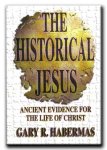- Joined
- Aug 21, 2013
- Messages
- 23,086
- Reaction score
- 2,375
- Location
- United States
- Gender
- Undisclosed
- Political Leaning
- Conservative
Ever so cute - denigration of points made against your views without supplying a single bit of new support or corroboration.
The books, Matthew, Mark, Luke, and John were not written by those whose names are found there today. This is verifiable if you were to take the time to actually read some scholarly, not apologetic works.
Absolute nonsense.
Let's just take Matthew.
"The early church fathers were unanimous in crediting the gospel to Matthew. Hiebert claims, “The earliest is the testimony of Papias, bishop of Hierapolis, dating to the first half of the second century. Following Papias is Irenaeus “who wrote his famous Against Heresies around A.D. 185.” The next church father to attribute authorship to Matthew is Origen, who wrote in the early third century. He is quoted by Eusebius, who wrote in the early fourth century. Finally, Eusebius himself, in the early fourth century, documents that Matthew wrote the first gospel.
There is an unbroken witness to Matthew as the author of the first gospel going back to at least the middle of the second century..."
Who Wrote the Gospel of Matthew? ? #5 Post of 2010 | Tough Questions Answered
And you have the same sorts of attributions for the other Gospel writers.
You're busted, Somerville.

